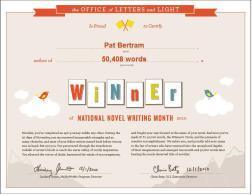Pat Bertram's Blog, page 227
July 26, 2013
Interview With a Character — Part 2
Yesterday I posted a part of an interview I’d once done with the hero of my grieving woman book. Talking with a character like this is a good way of solidifying ideas, especially for finding out who the character is and what she wants. Here is another part of that interview:
Pat: David was always so busy, he never had much time for you, but did he have time for your daughter?
Amanda: He always managed to make time for our daughter Thalia, for which I’m thankful. She loved him very much, though she doesn’t seem to be grieving. But maybe it’s different for her. She’s a grown woman with a life of her own, so she’s not panicking about growing old alone, or worrying about money, or any of the other things that go along with grieving a spouse. But everyone’s grief is different, so she could be internalizing it. Also, she feels betrayed. Apparently, she knew I was having a cyber affair. She doesn’t understand. Heck, I don’t understand. Can you explain it to me?
 Pat: Perhaps you were at a vulnerable time, grasping at life any way you could. Perhaps you needed someone to help you through the worst time of you life. Perhaps you really did think you’d moved on and didn’t realize you’d been denying what David’s death would mean to you. The best way to show yourself that he no longer meant everything to you was to find someone else who meant something to you.
Pat: Perhaps you were at a vulnerable time, grasping at life any way you could. Perhaps you needed someone to help you through the worst time of you life. Perhaps you really did think you’d moved on and didn’t realize you’d been denying what David’s death would mean to you. The best way to show yourself that he no longer meant everything to you was to find someone else who meant something to you.
Amanda: But I do love Sam. He isn’t just a replacement. And anyway, he can’t be a replacement. He’s married.
Pat: Yeah, I’m sorry for that, but there’s no way around it. I mean, I could make him single, but then there’d be no story. You’d go from David’s life to Sam’s. Period. No identity crisis. (Do they even call it an identity crisis anymore?) No coming of age story. No money problems.
Amanda: Seems good to me. After all, I’m the one who has to go through all that turmoil and grief. Alone. Hey! How come I don’t have any friends?
Pat: Maybe you were friends with other preacher’s wives. They are as busy as you once were and have little time for you. That seems to be a growing theme in the story — no time for Amanda. David had no time for you — he was too busy before he got ill, and afterward he became reclusive. Thalia has no time for you — she’s busy with her work and she’s angry at you. Sam doesn’t have much for you any more. And your friends have no time for you.
Amanda: That makes me seem pathetic. I don’t like feeling pathetic.
Pat: I don’t much like it, either. A pathetic hero is not much of a hero. Maybe I should throw more trauma your way.
Amanda: As if losing my husband, losing my daughter, and losing my home isn’t trauma enough. Maybe you could plan a trip for me to meet Sam. I’d sure like to get naked with him!
Pat: You would, you hussy.
Amanda: Not a hussy. Just a woman lost. A woman who doesn’t see herself as special yet who managed to find two great loves. It was fate’s joke that the two loves overlapped.
***
Pat Bertram is the author of the suspense novels Light Bringer, More Deaths Than One, A Spark of Heavenly Fire, and Daughter Am I. Bertram is also the author of Grief: The Great Yearning, “an exquisite book, wrenching to read, and at the same time full of profound truths.” Follow Pat on Google+. Like Pat on Facebook.
Tagged: book about a grieving woman, character interview, creating a character, indentity crisis


July 25, 2013
Interview With a Character
Three years ago when I was deep into my own grief, I started writing a book about a grieving woman. It’s been so long since I worked on the novel that while I remember the story, I don’t remember everything I wrote. Today I discovered something interesting. (Interesting to me, anyway.) Apparently one day I couldn’t think of anything to add to the story, so I interviewed the character. Here’s part of that interview:
Pat: Who are you?
Amanda: I don’t know. Isn’t that your job? To create me?
Pat: I was hoping you’d do it for me. Writers always talk about how their characters take over and do things the writers never intended. It’s never happened to me, but I thought perhaps this time things would be different.
Amanda: Different? Why?
Pat: Because you’re me. Or part me. The character of a grieving woman is based on me since I only know grief from my point of view, but the story is not my story. Well, it is my story since I’m writing it, but it’s not the story of my life. That part is made up, though I’m hoping some deeper truth will emerge from it.
Amanda: What sort of truth?
Pat: Hey! Who’s the interviewer here? I’m the one who’s supposed to be asking the questions.
Amanda: But you’re the one with the answers. So how can you be the one asking the questions? And anyway, you’re evading me. What sort of  truth are you looking for?
truth are you looking for?
Pat: The true sort. The universal sort. A truth that will mean something different to everyone who sees it.
Amanda: Clear as a bell.
Pat: Good thing you’re not the writer—clichés are so passé. But we’re getting off course here. Will people believe that a woman grieving her husband can love another man? Won’t they think that new love negates grief?
Amanda: Seems as if it’s your responsibility as a writer to make people believe what you want them to believe.
Pat: The problem is that you’re boring. How do I make you interesting? I mean, you sound like a whiner, always screaming, “I can’t do this.”
Amanda: But if you notice (and you should since you’re the one who wrote it), every time I say I can’t do something, I do it. Isn’t that the point you’re trying to make, that I don’t know who I am? That even though I’m in my fifties (cripes, couldn’t you have made me forty-something? Fifty sounds so old), I’m a chrysalis, or maybe I mean I’m in a chrysalis. I’ve been alive a lot of years, but never lived. I’ve defined myself by other people — first as a daughter, then wife, mother, and now cyber-lover. I need to learn how to define myself by myself, to find my home within me now that David’s death has stolen my home from me. He was my home, not the manse we lived in for the past fifteen years. I have to leave the manse, too, since I’m no longer the preacher’s wife. And anyway, the church is selling it.
Pat: I never asked you if you wanted to be a preacher’s wife. Would you rather be a different character? A cop, perhaps, or a CEO?
Amanda: I don’t know what I want to be — isn’t what the story is about? Me finding out who I am? A coming-of-age in middle age story? For that purpose, a preacher’s wife is as good as anything. Also could explain why I led such a sheltered life. A CEO probably wouldn’t have defined her life by her husband’s life. A preacher’s wife, by definition, defines her life by his.
Pat: I just thought of something — how about if I make you the preacher?
Amanda: Wouldn’t work story wise. I wouldn’t get kicked out of the manse when David died, I wouldn’t have defined my life by his, and I’d probably have been too busy to have an online affair. Until David got sick and was forced into idleness, he never had much time. I guess I’m stuck being the preacher’s wife until we can figure out who I will become.
***
Pat Bertram is the author of the suspense novels Light Bringer, More Deaths Than One, A Spark of Heavenly Fire, and Daughter Am I. Bertram is also the author of Grief: The Great Yearning, “an exquisite book, wrenching to read, and at the same time full of profound truths.” Follow Pat on Google+. Like Pat on Facebook.
Tagged: character interview, creating a character, grieving woman novel


July 24, 2013
A Novel About a Grieving Woman
Several months after the death of my life mate/soul mate, I participated in the National Novel Writing Month. I’ve never seen the point of NaNoWriMo — if you want to write, write. You don’t need to be part of an international campaign to foist more hastily written tripe on an unsuspecting public. Still, in an effort to deal with my grief, I’d been trying all sorts of new things, and NaNoWriMo seemed like a challenge. I’ve always been a slow writer, and I wanted to see what would happen if I wrote without regard for any sort of cohesiveness or literary merit. Other people who had participated told me that when you let  yourself go, wonderful things happened, which, in my case, was not at all the truth.
yourself go, wonderful things happened, which, in my case, was not at all the truth.
Still, I did finish the word count. (And forgive me if I add that I see no benefit to counting words. What difference does it make if one person can write 10,000 words in a day, while another can only write 100?) What I mostly ended up with at the end of the month were disconnected scenes of a novel about a grieving woman. I wanted to get the emotion down on paper before I forgot the horror and agony of new grief, and that I did.
Well, now I’m typing up those long-fallow pages, and it’s been a surprise. The angst is there, but so is humor. How did I manage to write anything but the most sorrowful prose while still in the depths of grief? For example, here is a passage I typed up this morning:
Amanda made her way to the buffet table. The merry widows were huddled together, poring over the selection.
“Make sure Paula brings her meatballs to my funeral lunch,” Jackie said. “Katherine’s lime mold is something I’d just as soon not see.”
“You wouldn’t see it anyway,” Muffie cackled. “You’ll be dead. I like a good Jell-O mold, especially with marshmallows. Put that on my list.”
“Buffalo wings are my favorite,” Barb said. “They’re messy, so be sure to bring some of those wet wipes. Everyone will be dressed in their best, and I don’t want the men remembering me by stains on their ties.”
Amanda slipped away from the three long-time widows before they could see her. No way could she deal with them today. Usually she saw them as the fairy godmothers in the Disney version of Sleeping Beauty—brightly dressed, rotund, and into everyone’s business—but today they struck her more like the witches in Macbeth.
Would she become like them now that David was gone, with nothing better to look forward to than her own funeral? But there was Sam . . .
Okay, so it isn’t laugh-out-loud funny, but it is a lighthearted respite from the rest of the story. I wonder what other gems I’ll find that I’ve forgotten?
At the time I conceived the story, I wasn’t sure where to go with it — hence the disconnected scenes — but I don’t think I need to go anywhere with it other than finishing what I already have: a grieving widow, an angry daughter, a cyber lover, a gun, and hints of evil-doing by the dying husband (a preacher, incidentally, who supposedly led an exemplary life.) Sounds like an interesting story!
***
Pat Bertram is the author of the suspense novels Light Bringer, More Deaths Than One, A Spark of Heavenly Fire, and Daughter Am I. Bertram is also the author of Grief: The Great Yearning, “an exquisite book, wrenching to read, and at the same time full of profound truths.” Follow Pat on Google+. Like Pat on Facebook.
Tagged: if you want to write, NaNoWinner, NaNoWriMo, novel about grieving woman, word counts


July 23, 2013
The Zipper Philosophy of Life and Harmony
Ever since the death of my life mate/soul mate, I’ve been trying to rebuild my life, but in a better way, perhaps to find a deeper connection to the universe or simply to be more open to what is. I haven’t known how to do this — no matter what I do, I always seem to be just me, a sad and lonely woman struggling to fit all the pieces together.
Today out walking in the desert, I had a bit of a revelation. I understood that we are all a mass of conflicts and contradictions, with mental, physical, spiritual, and emotional needs and wants all striving for ascendancy. Nothing is in harmony. But . . . if we  could find a way to strike a balance with all these elements they would fit together like a zipper, and then the whole universe would fall open to us.
could find a way to strike a balance with all these elements they would fit together like a zipper, and then the whole universe would fall open to us.
For example, I have a friend who is struggling with health issues. The diet she can eat for her gall bladder troubles is the worst diet for her irritable bowel syndrome, and the diet she can eat for her irritable bowel syndrome is the worst she can eat for her gall bladder issues. The few foods she can eat, she doesn’t like, and the foods she likes she can’t eat.
If she could find a balance in her diet, the perfect way of eating to take each of her issues into consideration, maybe everything in her life would also fall into place. (In addition to her health problems, she’s struggling with grief and family issues.) I doubt things will work out easily in her situation — her doctors tell her she needs gall bladder surgery, which is one solution to one of her problems.
I don’t have her problems. My conflicts are nebulous, having more to do with who I am and who I want to be, what I want and don’t want rather than health issues, but they still bring disharmony to my life.
Getting rid of all conflicts is one way to find harmony (just as surgery is a way to solve part of my friend’s health problems) but the trouble with removing conflicts from your life rather than resolving the conflicts is that it subjects you to disharmony if a conflict finds its way back in.
I don’t know if this zipper idea is true or not. I don’t know if it’s possible. I wouldn’t even know how to go about striking a balance with all life’s disharmonious elements, but it seems to me as if it’s a goal worth striving for, if only to find out what will happen when the zipper is finally opened.
***
Pat Bertram is the author of the suspense novels Light Bringer, More Deaths Than One, A Spark of Heavenly Fire, and Daughter Am I. Bertram is also the author of Grief: The Great Yearning, “an exquisite book, wrenching to read, and at the same time full of profound truths.” Follow Pat on Google+. Like Pat on Facebook.
Tagged: conflicts in life, getting rid of conflicts, life and harmony, striking a balance, zipper philosphy


July 22, 2013
Another Stage of Waning Grief
Yesterday I wrote about how I am now feeling three and a third years after the death of my life mate/soul mate. I admitted I wasn’t feeling much. My life seems empty. There’s no oomph. No spark.
I wish I wanted something, was in love with something, felt something besides ever-fading sorrow. But I don’t know how to go from where I am to where I need to be.
And it’s not just me who feels this way. From the comments and emails I received, it seems as if many others who also lost their mates in 2010 feel the same as I do. Some people who lost their mates that year are in new relationships, have done something  equally significant to jump-start their life, or have children to raise by themselves, but unless fate intervenes, the rest of us have to figure out how to accomplish a new beginning by ourselves. And we haven’t a clue how to do it.
equally significant to jump-start their life, or have children to raise by themselves, but unless fate intervenes, the rest of us have to figure out how to accomplish a new beginning by ourselves. And we haven’t a clue how to do it.
I basically live the same way now as I did when I was coupled, but what took on significance when it was for “us” seems lame when it’s just for me. It’s not that I don’t think I’m worthy — of course I do because I am. It’s more that when the two of us were together, everything we did somehow seemed to help build our shared life. Every idea seemed to expand “us.” Every finished project seemed to fulfill “us.” Even something as simple as jointly preparing a meal was for “us.” Each of those things was also an act of love, a commitment to each other, even if it didn’t seem so at the time, which made them doubly or triply significant.
Now a meal is just a meal. A project finished is nothing more than a task completed. A bright idea is simply blog fodder.
If I were new, starting out in life for the first time, none of this would be a problem since everything is new and exciting when one is young, but I’ve done most of what I wanted to, or at least tried to do it. To be honest, the things I wanted to do were essentially cerebral — reading, researching, thinking, writing. I haven’t traveled the world but never wanted to. Haven’t lived lavishly but see no need for it. Haven’t partied till I dropped but never had the energy for it. I have done volunteer work but now there’s no cause I’m passionate about. (I’m still doing volunteer work, but it’s mostly online, so it doesn’t do much to give me something to live for.)
It’s possible this oomphlessness is simply another stage of waning grief — it generally takes four to five years to fall in love with life again (assuming one was ever in love with life) and most of us 2010ers are still many months away from that magic number. If this is the case, the emptiness will disappear by itself once I’ve come to term with it, or it will metamorphose into another equally confusing phase.
But it’s also possible this is what my life is, in which case I’ll have to find a way to make the insignificant happenings significant again, because frankly, spending the rest of my days feeling like this is unthinkable.
***
Pat Bertram is the author of the suspense novels Light Bringer, More Deaths Than One, A Spark of Heavenly Fire, and Daughter Am I. Bertram is also the author of Grief: The Great Yearning, “an exquisite book, wrenching to read, and at the same time full of profound truths.” Follow Pat on Google+. Like Pat on Facebook.
Tagged: death of spouse in 2010, falling in love with life, grief and feelings of emptiness, grief at three years


July 21, 2013
Three Years, Three Months, Three Weeks, and Three Days of Grief
It’s been three years, three months, three weeks, and three days since the death of my life mate/soul mate. With all those threes, this should be a mystical day, but it’s a day like any other. I’m not especially grieving, though I’m not ungrieving, either. It’s just me and my normal underlying sadness, my missing him, my wondering about the future.
I’m to the point where I need something more, something beyond the bleakness of my daily life, but that “something more” comes in small doses and is not enough to sustain me. I take quick trips, go out to lunch occasionally, write a little, go walking in the desert. Although my 96-year-old father is doing well and is still quite independent, I am on a short leash (or at least it feels that way) since he likes having someone around in case of emergency.
But, that is just an excuse. The truth is, I don’t know what to do and wouldn’t know what to do even if I weren’t here looking  after my father. I’d travel, of course, but it seems to me that taking an extended trip by myself would be terribly lonely and perhaps even feel pointless. I drove by the ocean the other day and couldn’t think of a single reason to stop. I’ve been to the ocean, so it wasn’t anything new. Just a lot of water. (In my defense, it was very late and I was very tired.)
after my father. I’d travel, of course, but it seems to me that taking an extended trip by myself would be terribly lonely and perhaps even feel pointless. I drove by the ocean the other day and couldn’t think of a single reason to stop. I’ve been to the ocean, so it wasn’t anything new. Just a lot of water. (In my defense, it was very late and I was very tired.)
I try to be upbeat, try to believe in endless possibilities (because of course, that is the nature of the universe), but I don’t yet see those possibilities in my daily life. I try to think differently, to feel differently, to open myself up to change, but I’m always just me. Alone. Waiting.
Maybe things will be different when I’m totally alone, when I am free of responsibilities, but I no longer know if that will make a difference. I feel self-indulgent at times even mentioning any of this, considering what terrible lives some people are forced to live, but I can’t live any life but my own. And my own feels empty.
If it sounds as if I’m feeling sorry for myself, there’s perfectly good explanation for that. Today I do feel sorry for myself. I have managed to get through three years, three months, three weeks, and three days since his death, and I will continue managing, but I wish I wanted something, was in love with something, felt something besides ever-fading sorrow.
***
Pat Bertram is the author of the suspense novels Light Bringer, More Deaths Than One, A Spark of Heavenly Fire, and Daughter Am I. Bertram is also the author of Grief: The Great Yearning, “an exquisite book, wrenching to read, and at the same time full of profound truths.” Follow Pat on Google+. Like Pat on Facebook.
Tagged: being alone, believing in possibilities, daily life, death of a soul mate, lonely, three years of grief


July 20, 2013
Fodder For the Facebook Machine
I have a discussion group on Facebook, Suspense/Thriller Writers, that is constantly evolving because of the site’s ever-changing policies, and what was once fun, has now turned into a burden.
In the beginning, when I was new to Facebook, the groups were pretty much worthless. They were mostly discussion groups where no one discussed, but I found a way to make it work. At the time, FB had separate areas for links and promos and such. I was fine with whatever anyone wanted to post — I just wanted the discussion group. And it was a great discussion group. Each week I’d ask a different author to pose a topic, I’d email the group members, and we’d have an interesting discussion. I learned a lot from those people.
Well, Facebook couldn’t leave well enough alone. They changed the group format, and since our original groups didn’t fit in with their new format — we had too many members — they planned to get rid of all of us. Eventually enough people complained, and they let our groups remain, but they changed them completely — got rid of the discussion forum, took away the ability for  group administrators to send messages to the group, and combined everything else into one huge mess on the wall.
group administrators to send messages to the group, and combined everything else into one huge mess on the wall.
Members of the group left in droves. They couldn’t stand the constant barrage of promotion. Finally, we decided to ban any sort of promotion from the wall and turn it into strictly a writing discussion group. (No publishing, formatting, or promotion questions are allowed — this is strictly a group to discuss the craft of writing.) It actually worked well. As a thank you to the members for adhering to our rules, I set up a separate event every Saturday. Well, FB decided there was something wrong with that, and took away my ability to set up events. So I set up a separate group for promotion.
All went fine for a while until FB decided to change things again. Instead of ignoring groups, they decided to promote them — and the groups with the most members got the most promotion. Sounds great, right? Wrong! Now every author on FB who has a book to promote is made aware of our group, and we’ve been inundated with new members. Members, I might add, who don’t pay attention to the group rules, which are pinned to the top of the wall for all to see. (It’s amazing to me how often someone will “like” the rules or comment about how great the no promo rule is, and then immediately post a promo. I guess people think rules apply to everyone else but them?)
I spend way too much time every day deleting promos and banning those who posted the promo link. I used to give people the benefit of the doubt, but if I didn’t ban them, they’d simply post something else. (Doesn’t anyone get the point of soocial networking? You don’t constantly beat people over the head with the links to your books. You get to know them and then let them find you.)
I realize that FB is not a public site — we are all fodder for the great FB machine, and are subject to whatever changes they deem necessary — but all these machinations are burdensome. Still, the group is worth saving. How often on the internet, and especially Facebook, do you find a group of people who help each other with the craft of writing? So I’ll just deal with the frustration and hope that eventually the gods of Facebook decide to turn their attention elsewhere.
***
Pat Bertram is the author of the suspense novels Light Bringer, More Deaths Than One, A Spark of Heavenly Fire, and Daughter Am I. Bertram is also the author of Grief: The Great Yearning, “an exquisite book, wrenching to read, and at the same time full of profound truths.” Follow Pat on Google+. Like Pat on Facebook.
Tagged: Facebook, Facebook groups, social networking, Suspense/Thriller Writers group, Suspense/Thriller Writers Group on Facebook


July 19, 2013
Grief: “It was a long time ago.”
Last night I watched the 2002 movie Heaven Must Wait. In one scene, Andrew McCarthy tells Louise Lombard that his mother died. She told him she was sorry. He said, “It was a long time ago.”
And I started crying.
I don’t know why that line struck me as being so poignant since I’ve heard the same sentiment in dozens of movies during the past few years. Maybe it was the sadly resigned way McCarthy delivered the line. Perhaps it was the underlying truth of the  words — that time passes. Probably it was the reminder that my life mate/soul mate is moving further and further away from me. Or am I moving away from him? Either way, time is separating us.
words — that time passes. Probably it was the reminder that my life mate/soul mate is moving further and further away from me. Or am I moving away from him? Either way, time is separating us.
Certain parts of our shared life are still very fresh in my mind: the day we met, the last time I held him in my arms, the moment of his death. It sometimes seems we parted such a short time ago that he could still be at home, waiting for me. But the years are passing. That first year crept by slowly, as if time itself were reluctant to let him go, but the years are beginning to pass swiftly now. It’s been more than three years since he died. Soon it will be four years, then five. And some day, I too will say, “It was a long time ago.”
Who will I be then? What will I have done? Will I still miss him? Of course I will miss him. I will always miss him. He was a major part of my life for thirty-four years, but with the passing years, his influence on my life might wane. Other experiences will have an impact on me. Other thoughts will change the way I view life. And he will have no part in any of it.
I don’t cry much for him any more. Days, weeks go by dry-eyed, though I have occasional upsurges of sadness. “Long time ago” is still a long way away, and yet last night I had the first inkling that such a time is approaching. And so, I cried for the coming years when he will be so very far from me that the tears will no longer come.
***
Pat Bertram is the author of the suspense novels Light Bringer, More Deaths Than One, A Spark of Heavenly Fire, and Daughter Am I. Bertram is also the author of Grief: The Great Yearning, “an exquisite book, wrenching to read, and at the same time full of profound truths.” Follow Pat on Google+. Like Pat on Facebook.
Tagged: a long time ago, Andrew McCarthy, grief and loss, grief passes, Heaven Must Wait, time and grief


July 18, 2013
Unplugged!
I did it! Yesterday, I turned off the computer. Stayed unplugged for twenty-four hours. That was the best part of the day — being unplugged. I’ve lost much of the joy I used to get from the internet — it now seems to be mostly a chore. Even  the computer games I’ve been playing are more tic than entertainment. So it was great being offline.
the computer games I’ve been playing are more tic than entertainment. So it was great being offline.
I wish I could say that my fishing for life expedition was as successful as being unplugged, but it was hellish. I’d agreed to drive a family member halfway to Santa Barbara. I decided that since I was halfway there, I should go all the way. Spend a quiet evening at the ocean. Take a walk by myself on the beach. Have a leisurely meal alone. Just wing it. But you know what they say about the best-laid plans of mice and men (and women) . . . well, my plans couldn’t have gone more awry.
What should have been an enjoyable trip was ruined by my companion’s ceaseless vitriol toward the people he believes have wronged him. And a quick trip ended up taking eight hours because we went the scenic route. Got to Santa Barbara after dark. Drove around looking for a place he could camp or people he knew, but everything had changed in the past twenty years, so he decided to return with me. By that time, I had no thread of enjoyment (or patience) left, so I came right back instead of spending the night. Got here at 3:30 in the morning (listening to his harangues all the way).
When you fish, you never quite know what you get. Well, despite everything, I did catch some life. I saw lovely views if just through the windshield — mountains by sunlight, ocean by moonlight. I learned how easily homicidal tendencies can rise in even a generally passive person. (I mean really, fourteen ceaseless hours? I might even have gotten off scott-free.) I learned that no matter how badly you feel for someone and would like to help, sometimes there is nothing you can do. And I discovered I’m nowhere near as nice or as kind as I think I am.
As you can see, today, I’m plugged in again, and let me tell you — the best thing about it is that it is QUIET! (I have the sound turned off so I never hear any of the typical computer noises.)
Ah. Silence.
***
Pat Bertram is the author of the suspense novels Light Bringer, More Deaths Than One, A Spark of Heavenly Fire, and Daughter Am I. Bertram is also the author of Grief: The Great Yearning, “an exquisite book, wrenching to read, and at the same time full of profound truths.” Follow Pat on Google+. Like Pat on Facebook.
Tagged: best laid plans, fishing for life, going offline, slilence, unplugged


July 17, 2013
Gone Fishing
I’m going to turn off my computer for the next twenty-four hours and take myself on a fishing trip. Not to fish for fish, of course — such a hobby is only peaceful for the one fishing; the poor fish are scared, hurt, and fighting for their life — but fishing for life. See what happens when I am disconnected from my usual online pursuits. Just take off for a day. Go wherever. See what I can see. Feel what I can feel.
If you want to contact me, leave a comment and I’ll get back to you tomorrow. Or whenever.
***
Pat Bertram is the author of the suspense novels Light Bringer, More Deaths Than One, A Spark of Heavenly Fire, and Daughter Am I. Bertram is also the author of Grief: The Great Yearning, “an exquisite book, wrenching to read, and at the same time full of profound truths.” Follow Pat on Google+. Like Pat on Facebook.
Tagged: disconnecting from the internet, fishing for life, gone fishing






